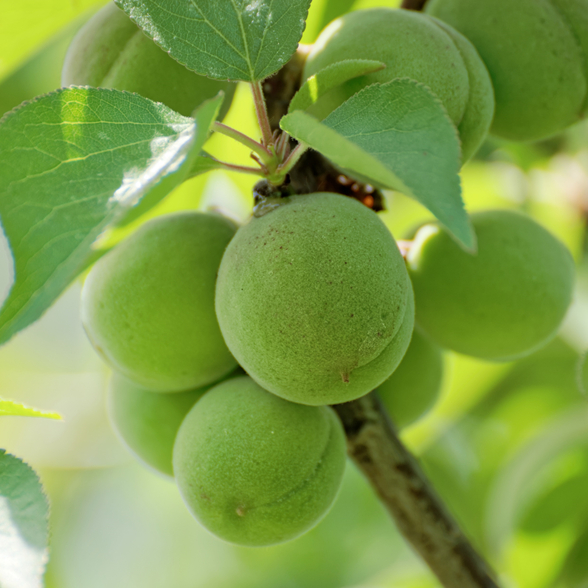
Background
People take Japanese apricot for colds, stomach and intestinal disorders, to prevent heart disease, sunburn, and other conditions, but there is no good scientific evidence to support these uses.
In manufacturing, Japanese apricot is added to cosmetic lotions.
Japanese apricot fruit juice is a traditional Japanese beverage.
Safety Safety definitions
When applied to the skin: There isn't enough reliable information to know if Japanese apricot is safe or what the side effects might be.
Special Precautions & Warnings:
Pregnancy and breast-feeding: There isn't enough reliable information to know if Japanese apricot is safe to use when pregnant or breast-feeding. Stay on the safe side and avoid use.Diabetes: Japanese apricot might lower blood sugar. Watch for signs of low blood sugar (hypoglycemia) and monitor your blood sugar carefully if you have diabetes and use Japanese apricot.
Surgery: Japanese apricot might slow blood clotting or affect blood sugar levels. There is some concern that it might increase the risk of bleeding or interfere with blood sugar control during and after surgery. Stop using Japanese apricot at least 2 weeks before a scheduled surgery.
Effectiveness
- Persistent heartburn. People who eat Japanese apricot every day might be less likely to have persistent heartburn than those who don't eat Japanese apricot.
- A digestive tract infection that can lead to ulcers (Helicobacter pylori or H. pylori). Drinking diluted concentrate of Japanese apricot juice doesn't seem to help treat H. pylori infections. Also, most people who eat Japanese apricot fruit don't seem to have a lower chance of developing an H. pylori infection compared to those who don't eat Japanese apricot.
- Swelling (inflammation) of the liver caused by the hepatitis C virus (hepatitis C). Early research shows that taking Japanese apricot improves markers of liver injury in people with hepatitis C. But it's unclear if taking Japanese apricot reduces the risk of complications of hepatitis C.
- High blood pressure. Early research shows that taking Japanese apricot doesn't reduce blood pressure in people with high blood pressure.
- Build up of fat in the liver in people who drink little or no alcohol (nonalcoholic fatty liver disease or NAFLD). Early research shows that taking Japanese apricot improves markers of livery injury in people with NAFLD. But it's unclear if taking Japanese apricot reduces the risk of complications of NAFLD.
- Fever.
- Cough.
- Stomach disorders.
- Trouble sleeping (insomnia).
- Menopausal symptoms.
- Cancer.
- Prevention of heart disease.
- Fatigue.
- Gout.
- Sunburn, when applied to the skin.
- Other conditions.
Dosing & administration
Interactions with pharmaceuticals
Medications for diabetes (Antidiabetes drugs)
Interaction Rating=Moderate Be cautious with this combination.
Japanese apricot might lower blood sugar. Diabetes medications are also used to lower blood sugar. Taking Japanese apricot along with diabetes medications might cause your blood sugar to go too low. Monitor your blood sugar closely. The dose of your diabetes medication might need to be changed.
Some medications used for diabetes include glimepiride (Amaryl), glyburide (DiaBeta, Glynase PresTab, Micronase), insulin, pioglitazone (Actos), rosiglitazone (Avandia), chlorpropamide (Diabinese), glipizide (Glucotrol), tolbutamide (Orinase), and others.
Medications that slow blood clotting (Anticoagulant / Antiplatelet drugs)
Interaction Rating=Moderate Be cautious with this combination.
Japanese apricot flower extract might slow blood clotting. Taking Japanese apricot flower extracts along with medications that also slow clotting might increase the chances of bruising and bleeding.
Some medications that slow blood clotting include aspirin, clopidogrel (Plavix), diclofenac (Voltaren, Cataflam, others), ibuprofen (Advil, Motrin, others), naproxen (Anaprox, Naprosyn, others), dalteparin (Fragmin), enoxaparin (Lovenox), heparin, warfarin (Coumadin), and others.
Interactions with herbs & supplements
Herbs and supplements that might slow blood clotting: Japanese apricot flower extract might slow blood clotting. There is some concern that taking Japanese apricot extract along with other natural products that have this same effect might increase the risk of bruising and bleeding. Some other herbs with that can slow blood clotting include angelica, clove, danshen, garlic, ginger, ginkgo, and many others. Don't use Japanese apricot with any of these.




